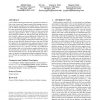Free Online Productivity Tools
i2Speak
i2Symbol
i2OCR
iTex2Img
iWeb2Print
iWeb2Shot
i2Type
iPdf2Split
iPdf2Merge
i2Bopomofo
i2Arabic
i2Style
i2Image
i2PDF
iLatex2Rtf
Sci2ools
157
Voted
MOBISYS
2008
ACM
2008
ACM
Behavioral detection of malware on mobile handsets
A novel behavioral detection framework is proposed to detect mobile worms, viruses and Trojans, instead of the signature-based solutions currently available for use in mobile devices. First, we propose an efficient representation of malware behaviors based on a key observation that the logical ordering of an application's actions over time often reveals the malicious intent even when each action alone may appear harmless. Then, we generate a database of malicious behavior signatures by studying more than 25 distinct families of mobile viruses and worms targeting the Symbian OS--the most widely-deployed handset OS--and their variants. Next, we propose a two-stage mapping technique that constructs these signatures at run-time from the monitored system events and API calls in Symbian OS. We discriminate the malicious behavior of malware from the normal behavior of applications by training a classifier based on Support Vector Machines (SVMs). Our evaluation on both simulated and real...
Current Mobile Viruses | Malicious Behavior Signatures | Mobile Devices | MOBISYS 2008 | Wireless Networks |
Related Content
| Added | 24 Dec 2009 |
| Updated | 24 Dec 2009 |
| Type | Conference |
| Year | 2008 |
| Where | MOBISYS |
| Authors | Abhijit Bose, Xin Hu, Kang G. Shin, Taejoon Park |
Comments (0)

